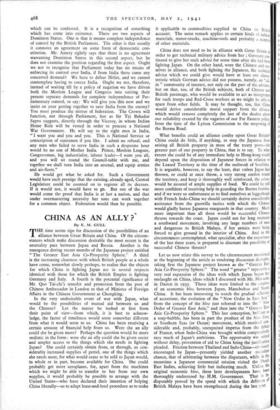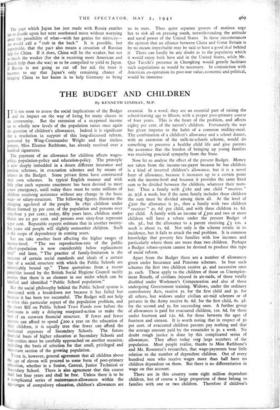CHINA AS AN ALLY ?*
By E. M. GULL
THE time seems ripe for discussion of the possibilities of an alliance between Great Britain and China: Of the circum- stances which make discussion desirable the most recent is the neutrality pact between Japan and Russia. Another is the emergence during recent months of the Japanese project entitled " The Greater East Asia Co-Prosperity Sphere." A third is the increasing clearness with which British people as a whole have come, somewhat slowly perhaps, to realise that the objects for which China is fighting Japan are in several respects identical with those for which the British Empire is fighting Germany and Italy. A fourth is the potential significance of Mr. Quo Tai-chi's transfer and promotion from the post of Chinese Ambassador in London to that of Minister of Foreign Affairs in the Chinese Government at Chungking.
In the very undesirable event of war with Japan, what would be the possibilities of mutual aid between us and the Chinese? Let the matter be looked at first from their point of view—from which, it is best to acknow- ledge, the factor of timeliness would seem somewhat different from what it would seem to us. China has been receiving a certain amount of financial help from us. Were she an ally could she be given more? Perhaps the question would be more realistic in the form: were she an ally could she be given easier and ampler access to the things which she needs in fighting Japan? She could certainly obtain from, or through, us con- siderably increased supplies of petrol, one of the things which she needs most, for what would cease to be sold to Japan would, in whole or in part, become available for China. She could probably get more aeroplanes, for, apart from the machines which we might be able to transfer to her from our own supplies, it would probably be possible to arrange with the United States—who have declared their intention of helping . China liberally—so to adapt lease-and-lend procedure as to make it applicable to commodities supplied to China on British account. The same remark applies to certain kinds of railway materials, motor-trucks, machine-tools and probably a number of other materials.
China does not need to be in alliance with Great Britain in order to get technical military advice from her ; Germany con- tinued to give her such advice for some time after she had been fighting Japan. On the other hand, were the Chinese and our- selves in alliance, and both fighting the Japanese, the technical advice which we could give would have at least one charac- teristic which German advice did not possess, namely, an "a11 in " community of interest, not only on the part of the advisers, but on that, too, of the British subjects, both of Chinese and British parentage, who would be available to act as interpreters for such troops and Red-Cross workers as we might be able to spare from other fields. It may be thought, too, that China would derive considerable moral support from the alliance, which would remove completely the last of the doubts about our reliability created by the vagaries of our Far Eastern policy, from the time of the Lytton Commission to the reopening of the Burma Road.
What benefits could an alliance confer upon Great Britain? China could do little, if anything, to stop the Japanese from seizing all British property in most of the treaty ports—the greater part of our property in China, that is to say. To what extent she could be of any immediate help to Hong-kong would depend upon the disposition of Japanese forces in relation to the Leased Territory at the time of the outbreak of hostilities. It is- arguable, however, to say the least, that unless Japan had thrown, or could at once throw, a very strong cordon round the territory, and keep it thoroughly well reinforced, the colony would be assured of ample supplies of food. We could be still more confident of receiving help in guarding the Burma frontier, and if we were so unfortunate as to find ourselves at loggerheads with French Indo-China we should certainly derive considerable assistance from the guerrilla tactics with which the Chinese would gladly harass Japanese rearguards in that country. Much more important than all these would be successful Chinese thrusts towards the coast. Japan could not for long maintain a southward movement, involving any large numbers of men and dangerous . to British Malaya, if her armies were being
i
forced to give ground in the interior of China. And in the circumstances contemplated, what specialist, after the experience of the last three years, is prepared to discount the possibility of successful Chinese thrusts?
Let us now relate this survey to the circumstances mentioned at the beginning of the article as rendering discussion desirable, taking first the Japanese project known as the " Greater East Asia Co-Prosperity Sphere." The word " greater " represents a very real expansion of the ideas with which Japan began her onslaught on China, ideas which I discussed with Mr. Matsuoka in Dairen in 1935. ' Those ideas were limited to the creation of an economic bloc between Japan, Manchukuo and North China. It has been interesting to watch the gradual adhesion of accretions, the evolution of the " New Order in East Asia" from the concept of the bloc just referred to into the New Order of Greater East Asia," and then into the " Greater East Asia Co-Prosperity Sphere." This last conception,' brilliant as a soap-bubble, has been in part the product of the Nan Yang or Southern Seas (or Ocean) movement, which received con- siderable and, probably, unexpected impetus from the defeat of France, when Indo-China was brought within comparatively easy reach of Japan's ambitions. The opportunity was seized without delay, prevention of aid to China being the justification pleaded. Friction between Thailand and Indo-China—obviously encouraged by Japan—presently yielded another succulent chance, that of arbitrating between the disputants, while in the meantime a Japanese commercial mission visited the Duo East Indies, achieving little but indicating much. Unlike the original economic bloc, these later developments have been thoroughly understood by- H.M. Government. That is in- disputably proved by the speed with which the defences of British Malaya have been strengthened during the last Year. The pact which Japan has just made with Russia enables her to decide upon her next southward move without worrying about the possibility of what—with her genius for mimicry— she would call a " stab in the back." It is possible, but improbable, that the pact also means a cessation of Russian help for China. If it does, China will be the weaker, but not so much the weaker (for she is receiving more American and British help than she was) as to be compelled to yield to Japan. If Russia is not going to cut off her aid, the truer it becomes to say that Japan's only remaining chance of bringing China to her knees is to help Germany to bring us to ours. Thus quite separate groups of motives urge her to risk all on pressing south, notwithstanding the attitude and naval power of the United States ' In these circumstances the opinion that an alliance between China and Great Britain is by no means improbable may be said to have a good deal behind it. There can hardly be any doubt as to the popularity which it would enjoy both here and in the United States, while Mr. Quo Tai-chi's presence in Chungking would greatly facilitate such negotiations as would be necessary. In conjunction with American co-operation its post-war value, economic and political, would be immense.































 Previous page
Previous page